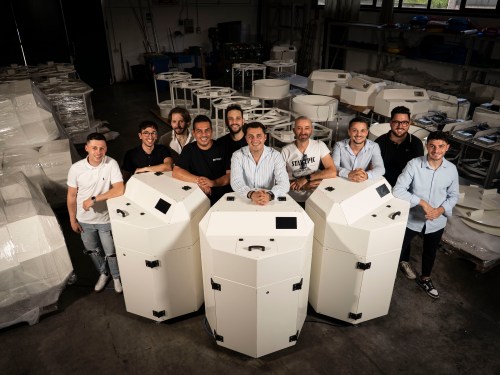Despite the well-known environmental benefits of recycling, it is estimated that less than 10% of the world’s plastic gets recycled. Ganiga Innovation aims to increase that percentage using AI-enabled robotic waste bins.
The Italian startup Ganiga built three products to help better manage waste and recycling. The first is a fleet of robotic waste bins, called Hoooly, that use generative AI to determine what is trash and what is recycling and sort the waste accordingly. The second is a smart lid that can be fitted to existing waste bins with the same functionality as its larger bin counterpart. The company also has a software product that allows companies to track the waste they produce; it offers suggestions for how a company can reduce waste production based on its waste data.
Ganiga will be showing off its technology as part of this year’s Startup Battlefield competition at TechCrunch Disrupt 2025, which runs from October 27 to 29 at San Francisco’s Moscone West.
Nicolas Zeoli, the founder and CEO of Ganiga, told TechCrunch that he has had dreams of building the next great company, like Facebook or Apple, since he was younger. He decided to focus on waste because he said issues surrounding waste management are very tangible in his native Italy, and it was clear there was not much being done about it. He stated that we all need to reclaim this problem, citing that in one year alone, over 100 million tons of plastic is created worldwide and only 9% is recycled, calling it a very real issue.
Zeoli launched Ganiga in 2021 and built its first prototype in 2022. He said they decided to focus on building a bin to solve this problem because it gives people a physical place to put waste that can ensure it gets properly recycled and sorted, and because the bins generate data that can be used for the future. Waste management is also expensive for companies, Zeoli said. Many organizations, especially in Europe, have ESG mandates to adhere to. Zeoli hopes Hoooly can help companies better track their waste production to help them reduce waste and waste-related costs.
Ganiga started selling its bins in 2024 and has since sold more than 120 robots to customers like Google and to multiple airports, including the ones in Bologna, Venice, and Madrid, among others. Zeoli said the company made 500,000 dollars in revenue in 2024 and is already up to 750,000 dollars in just the first nine months of 2025.
The company has also raised 1.5 million dollars in pre-seed funding from investors, including clean tech VC firm NextSTEP and NextEnergy Capital, among others. Ganiga is looking to raise a 3 million dollar seed round.
The company is gearing up to launch its latest product in November, the Hooolyfood, which is a software product that uses camera images to determine the exact amount of food waste. The company plans to delve into further software-focused products in the future, too, Zeoli said, based on the data their current bins and software are collecting.
Ganiga has focused on the European market thus far, but Zeoli said he is hoping to expand into the U.S.; the company is even thinking of moving its headquarters stateside in 2026. Zeoli stated that Ganiga is the first startup in the world to fill one airport with smart bins, emphasizing that they are not a prototype but a market-ready product.

